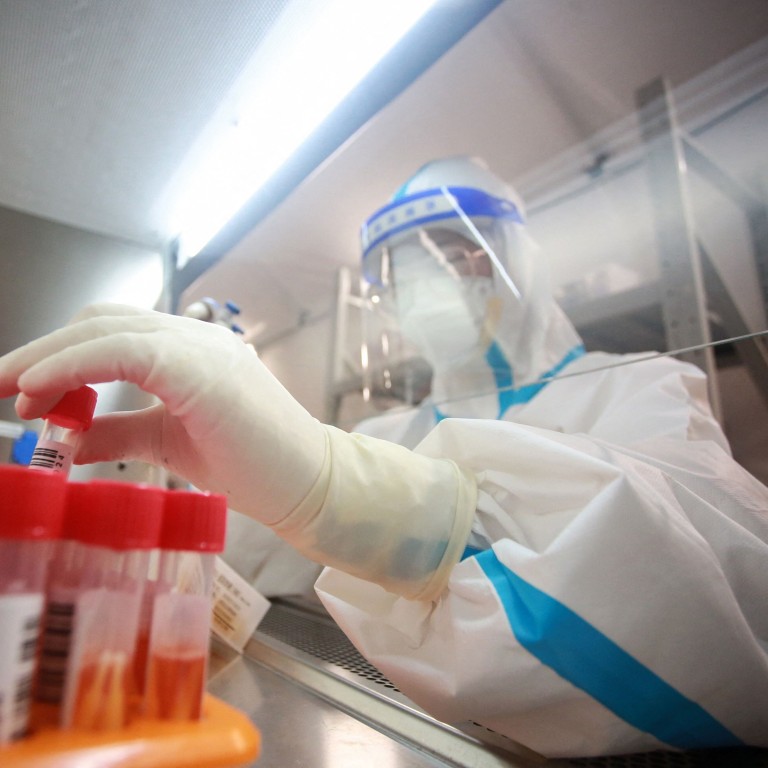
Coronavirus: citizens in one China hotspot undergo 12 rounds of tests to halt virus but there is a cost
- Yangzhou in Jiangsu province has carried out 17.6 million Covid-19 tests in 12 rounds since July 28 and has effectively curbed the spread
- Molecular virologist opposes mass testing compared to strategies such as frequent contact tracing and regular checks at key locations, including airports
According to local health officials, Yangzhou has carried out 17.6 million Covid-19 tests in 12 rounds since July 28.
“The 11th round of tests in my neighbourhood began at 6am this morning,” said Cai Yutong, a volunteer at a testing site in Jiaqiao community of the Hanjiang district on Tuesday. “I heard that there are two more rounds to come.”
About 3,000 residents were tested at the Jiaqiao testing site, run by six doctors and 30 volunteers.
“We don’t have enough doctors,” Cai said. “In theory, the doctors should take a break every two hours but they ended up working until the end of the day without taking any rest.”
Coronavirus: children hospitalised with Covid-19 in US hits record number
She said the testing site was operating past midnight last Thursday because the doctors were not available earlier.
“The mass testing put a heavy burden on the health workers, as they worked more than 10 hours every day and did not know when this would end,” Cai said. “Some doctors have become less disciplined in procedures like sterilisation and careless about the samples [collected].
“Some just didn’t care and they said the [test] results would be negative anyway,” she said referring to the fact that only a small number of people tested positive.
The rigorous testing not only put pressure on the health workers, but it has taken a toll on city- and district-level government finance.
As Jiangsu put its latest cost of mixed testing at 20 yuan (US$3) a time, the mass testing in Yangzhou has cost the local government around 3.5 billion yuan in the past 20 days.
With the transmission chain in the latest Nanjing outbreak spreading to at least 34 cities and 14 provinces across China, other cities nationwide also initiated mass testing to trace the spread of the Delta variant.
In the latest outbreak, according to Caijing magazine, 19 cities in China had carried out mass testing by August 10, in which more than 50 million people were involved and 130 million tests recorded. Eight cities had no new infections detected. The total cost of the tests was estimated to have exceeded 1.9 billion yuan.
As China vows to continue its zero-tolerance strategy, repeated mass testing, although expensive, is regarded by some as the only option for the country to stop the virus from spreading at the community level.
Speaking at a press conference early this month, Wu Feng, director of the Department of Respiratory and Critical Care Medicine at the Affiliated Hospital of Yangzhou University, said it was crucial for Yangzhou to conduct multiple rounds of mass testing.
“The transmission of the virus is a dynamic process, but testing takes place at one particular point in time. Therefore, it is not possible to trace every infection or source by [carrying out] one-time testing at a particular location,” Wu said.
Mass coronavirus tests aren’t necessary, says China’s chief epidemiologist
Dr Leung Chi-Chiu, a Hong Kong respiratory medicine specialist, said: “Whenever you find any sign of community transmission beyond what you can track down with the use of contact tracing, you have no other choices but to extend the testing to the next level.
“Mass testing is a tool to narrow down the scope of the transmission to design further containment measures and minimise the resources needed to immobilise the population,” Leung said.
“The cost of mass testing is probably small when compared with other economic costs that would have occurred if you allow the virus to spread over China.”
At a time when other parts of the world are choosing to open up, the question remains whether aggressive mass testing is a sustainable long-term option for China to keep Covid-19 at bay, particularly as Chinese cities scramble to curb the spread of the current clusters.
Professor Jin Dong-yan, a molecular virologist at the Li Ka Shing Faculty of Medicine at the University of Hong Kong, said he opposed mass testing compared to strategies such as frequent contact tracing and regular checks at key locations, including restaurants and airports.
“The cost of repeated mass testing is enormous,” he said. “Although people can be infected through just one event, the cases are not synchronised in testing positive. Maybe some are left out in one round of mass testing, so that they need to keep testing until no cases are found.
“The first infections at Nanjing Lukou International Airport were detected from check-ups, but the check-ups were not frequent enough to detect the cases before the Delta strain was transmitted to Zhangjiajie in Hunan province.
“In China, launching mass testing is a way to exercise power [of governance],” he said. “Had there not been a time lag in check-ups and contact tracing, the outbreak would not have escalated to such an extent.”
Additional reporting by Mimi Lau

